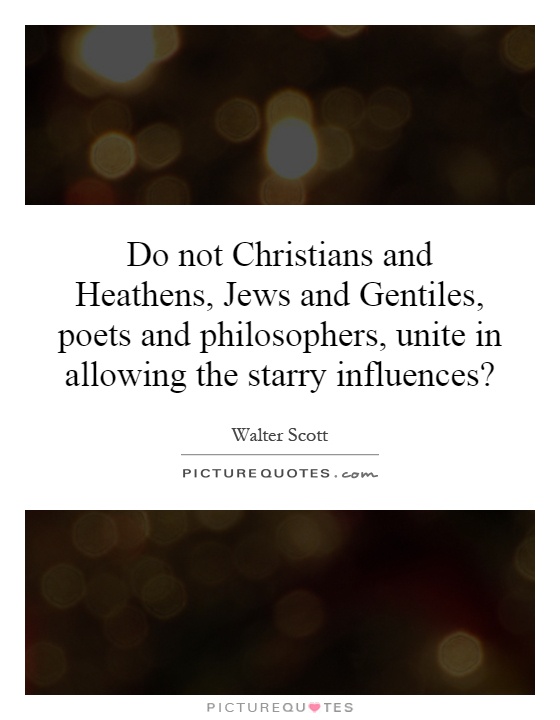Do not Christians and Heathens, Jews and Gentiles, poets and philosophers, unite in allowing the starry influences?

Do not Christians and Heathens, Jews and Gentiles, poets and philosophers, unite in allowing the starry influences?
In the quote “Do not Christians and Heathens, Jews and Gentiles, poets and philosophers, unite in allowing the starry influences?” Walter Scott raises a thought-provoking question about the universal connection between all people, regardless of their beliefs or backgrounds. Scott, a renowned Scottish novelist and poet, was known for his romantic historical novels that often explored themes of chivalry, honor, and the supernatural. In this quote, he suggests that despite the differences in religious beliefs, cultural practices, and intellectual pursuits, there is a commonality that binds humanity together – the shared awe and wonder of the natural world.Scott’s reference to “starry influences” alludes to the belief in astrology, the idea that the movements and positions of celestial bodies can influence human affairs and destinies. While astrology may be viewed skeptically by some, Scott uses it here as a metaphor for the interconnectedness of all people through a shared appreciation of the beauty and mystery of the universe. Regardless of one’s religious beliefs or cultural background, the sight of a starry sky can evoke a sense of wonder and awe that transcends individual differences.
The mention of Christians and Heathens, Jews and Gentiles, poets and philosophers further emphasizes the idea of unity in diversity. Scott suggests that people from different religious traditions, cultural backgrounds, and intellectual pursuits can all find common ground in their appreciation of the natural world and its wonders. Whether one finds inspiration in religious texts, scientific theories, or artistic creations, the beauty of the stars in the night sky is a universal experience that transcends boundaries and divisions.












 Friendship Quotes
Friendship Quotes Love Quotes
Love Quotes Life Quotes
Life Quotes Funny Quotes
Funny Quotes Motivational Quotes
Motivational Quotes Inspirational Quotes
Inspirational Quotes